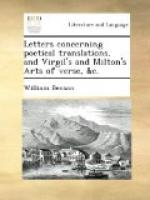“Eri_g_i_t, & mot_i_s s_i_b_i plaudi_t loet_i_or al_i_s_.”
—I_lle h_i_nc concentus_ i_n
omn_i
Carmi_ne D_i_v_i_n_i vati_s_.—
Which extempore Remark is itself an Instance of what I am taking notice of as imitated from Virgil.
3. You will perceive the Allusio Verborum to have a very good Effect in the second Line.
“Tarda mo_le m_o_vent, habitu gallina m_o_dest_o.”
4. The mixing the singular and plural Numbers in the third Line is very judicious.
“Caudam Cristasque rubentes.
Ovid would have said,
“Caudam Cristamque—
Lastly, The full Rhyme in the fourth Line makes the whole Paragraph very harmonious. It is not improper to produce here the Conclusion of the Description of AEolus’s Cave, which is one of the finest Passages in the AEneid.
“Sed pater omnipotens speluncis abdidit atris Hoc metuens, mo_lemque &_ mo_ntis insuper altos Imposu_it, regemque dedit, qui foedere certo Et premere, & laxas sciret dare jussus habenas.
Would not any body think that Vanerius intended to vie with Virgil in this Place?
October 2. 1736.
I am, SIR, _&c._
* * * * *
P.S.
The Examples I have given in this Letter of plain direct Rhyme are only in long or heroic Verse, but I might have instanc’d in Lyric Lines. Horace abounds in Rhyme. In the first Ode we find
Metaque fervidis Evitata rotis Palmaque nobilis Illum si proprio Condidit horreo
and several others.
In two of his finest Odes the following Lines are as full Rhymes as can possibly be made,
Nec venenatis Gravida sagittis Pone me Pigris Ubi nulla campis Arbor aestiva Recreatur Aura Aut in umbrosis Heliconis Oris Aut super Pindo Gelidove in Haemo.
The two last are doubly rhym’d.
LETTER V.
SIR,
I am now to consider Milton’s Versification under the same Heads as I have considered Virgil’s, so far as there is Opportunity of doing it.
I. To begin with The Varying of the Pause, which is the Soul of all Versification in all Languages. Verse is Musick, and Musick is more or less pleasing as the Notes are more or less varied, that is, raised or sunk, prolonged or shortned. In order to judge of the varying of English Versification, I first endeavour’d (as I have already said, with respect to the Latin) to find out the common Pause in English Verse, that is, where the Voice naturally makes some sort of Stop when a Verse is read. To this purpose I look’d into Mr. Cowley’s Davideis (for it would be of no use to quote such Authors as Quarles and Ogilby, who never had any Reputation for Poetry; but this Gentleman has been stil’d, and is at present recorded in Westminster-Abbey, as Anglorum Pindarus, Maro, Flaccus) and there I soon found the common Pause to be upon the last Syllable of the second Foot. For Example:




